Jesus' tomb buried in controversy
The Discovery Channel aired a documentary that some say is just an attempt to make money
By: Tess McBride News reporter
http://media.www.dailyemerald.com/media/storage/paper859/news/2007/03/08/News/Jesus.Tomb.Buried.In.Controversy-2764618.shtml
Throughout the millennia, the subjects of Jesus and Christianity have become as much historical as religious. "The Lost Tomb of Jesus," a documentary which aired Sunday on the Discovery Channel, claimed Jesus' family tomb was discovered, fueling both possibility and controversy as viewers examined the science behind Christianity.Produced by James Cameron, the director of "Titanic," the two-hour documentary began gaining publicity early last week when questions started arising over the accuracy of Cameron's claims that this is Jesus of Nazareth's tomb, and whether he was married and had a son.Since the airing of the show, scholars, religious leaders and students have commented on what they saw, if they believe it's accurate and what effect they think it will have on Christianity.What the documentary saysThe documentary begins by explaining the basics of what was found before venturing into what it could possibly mean.In 1980 in Talpiot, the suburbs of Jerusalem, Israeli construction workers discovered the 2,000-year-old tomb while digging the foundations for an apartment building.On the outside of the tomb, above the entrance, there was a decorative symbol, a chevron - an upside-down V - and a circle below it. Found on the inside were ten ossuaries, which are limestone boxes used to store the bones of the dead. "Five of the 10 discovered boxes in the Talpiot tomb were inscribed with names believed to be associated with key figures in the New Testament: Jesus, Mary, Matthew, Joseph and Mary Magdalene. A sixth inscription, written in Aramaic, translates to "Judah Son of Jesus," according to a Discovery Channel news article.Because of the extreme commonality of these names, the ossuaries were recorded and written about in scholarly journals, but the idea that these were the remains of Jesus and his family, including his wife, Mary Magdalene (also known as Mariamne) and their son, Judah, were not widely considered.The documentary states according to a statistical study, "the probability factor is 600 to 1 in favor of this tomb being the tomb of Jesus of Nazareth and his family" according to the grouping of the names (including "father" or "son" on the inscriptions). The film also documents mitochondrial DNA testing of the mother line, gathered from human residue found in the ossuaries of Jesus and Mary Magdalene. The tests proved the two were not maternally related."That means a couple of things. They were not siblings. They were not mother and child or father and daughter. They were unrelated. People buried in tombs are related in one of two ways: either by blood or by marriage. The results revealed an explosive possibility: that these two individuals, Jesus, son of Joseph, and Mariamne, were likely related by marriage," the Discovery Channel Web site stated.What a student saysUniversity student Bassel Menzalji said even though he's Muslim and doesn't follow Christian beliefs, he watched the documentary because the subject is sparking controversy."I believe in Jesus, but I also believe in Mohammed and I also believe in Buddha," Menzalji said, who added that he didn't know if he thinks the documentary was accurate or if it was made for the money and headlines. He said, "It doesn't matter is it's fake or real," because it caught peoples' attention.Either way, Menzalji found the documentary interesting and doesn't think the controversy will affect Christianity and the religion's followers."You can't just take away something that touches so many people's lives," he said. "Science and religion don't really mix."What a professor saysUniversity religious studies professor Daniel Falk said the documentary was based on unsound facts and was irresponsibly made. He said it exploited archeology and was created for economic, rather than scientific, gain."This is part of a broader problem in archeology today, partly in the Bible, where stuff gets exploited for making money," he said. "The fundamental arguments behind the documentary have yet to be proven."Falk, who specializes in early Judaism and Biblical studies, said the knowledge of this tomb and the names on the ossuaries have been known and studied by experts, the majority of whom are not convinced this was the tomb of the Biblical Jesus due to the commonalty of the names."These were known by experts in the field and then you (have) someone knowing nothing about archeology making these huge claims," he said.Falk added that a significant error in the documentary was the assumption that the ossuary of James, Jesus' brother, came from the same tomb, which the show said turned up on the black market in 2002 and is inscribed, "James, son of Joseph, brother of Jesus.""It remains doubtful the James ossuary came from the same tomb," Falk said.The documentary said experts could test the mineral particles gathered from James' ossuary and compare them with particles from the other ossuaries in the tomb, also including random ossuary samples in the study, to prove James' ossuary came from the same tomb.Falk said this would not conclude the ossuaries are from the same tomb because many of those buried in Jerusalem came from the same area of land, which he has visited, and it would be likely they had the same mineral deposits.What a pastor saysDr. Britt Minshall, a pastor and theologian of the United Church of Christ in Baltimore, has appeared as a religious consultant on FOX News Channel, CNN, and ABC.Minshall said that he, too, believes the Discovery Channel's motives are financial in airing the documentary, which, in his opinion, is not authoritative in any way.The engraved chevron and circle symbol over the entrance to the tomb is not consistent with that of the time of Jesus, said Minshall, who "has served as a religious consultant for archaeological expeditions in Africa, Central America, and the Middle East," according to his bio.Minshall said he believes the tomb was set up, not by the show's producers, but by worshipers and/or entrepreneurs around the eighth or ninth century."It's possible some rich guy who lived in Jerusalem at the time wanted to make a shrine," he said.Another possibility he said was that the tomb was "like a circus side show," created for the crusaders who would often purchase bones of alleged Biblical mentions to show their friends and families at home. The tomb could have been a form of entertainment for them, Minshall said.Despite "doing wonders for the Discovery Channel's ratings," Minshall doesn't believe this will harm Christianity."If you study Christian history over the past 2,000 years, it's a blood bath. If we didn't destroy Christianity, nobody else would," he said.

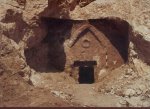
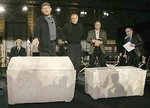






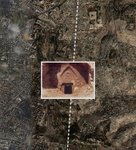


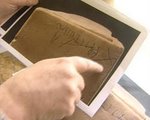






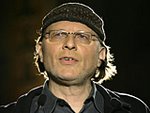

















No comments:
Post a Comment